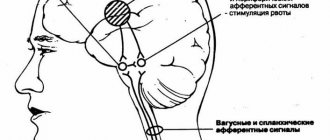When does toxicosis begin and end in pregnant women?
Toxicosis is a pathological condition that reflects the negative impact of pregnancy on a woman’s body.
Toxicosis develops, as a rule, as a result of disruption of the adaptive processes of the female body to bearing a fetus. The causes of toxicosis in the first trimester are hormonal imbalance, psychological changes and age criteria. Toxicosis is divided into early and late (preeclampsia). The first occurs in 50-60% of expectant mothers. Predisposing factors:
- poor nutrition and constant stress;
- bad habits;
- presence of chronic heart and kidney diseases;
- inflammatory processes in the genital organs;
- age (under 18 and over 35 years);
- history of abortion;
- asthenic constitution;
- prolonged overwork;
- unwanted pregnancy.
It is also worth noting that in women who lead a healthy lifestyle, this condition is much less common. A specialist will tell you during a consultation how to deal with severe toxicosis in the early stages of pregnancy.
Classification of severity
Regardless of at what stage of pregnancy the indicated symptoms appeared, even at the 37th week, toxicosis of pregnant women diagnosed with it still has one of three degrees of severity:
- light;
- average;
- heavy.
The first involves the occurrence of vomiting up to five times during the day. In this case, a prerequisite for determining the identified toxicosis to a mild degree of severity is vomiting only immediately after getting up, or immediately after eating.
The main problem here lies in the fact that with the constant inversion of the stomach, you already want to eat an order of magnitude less, because spending an hour in the toilet is not a particularly tempting prospect. All this leads to the fact that the expectant mother’s mood noticeably worsens, and she begins to look forward to when she will feel better.
With such a forced hunger strike, the body will lose about two to three kilograms, which will not pose a significant threat to the child, provided that the woman’s initial weight was within the normal range.
A mild degree of toxicosis can be easily corrected on an outpatient basis, which involves revising your daily routine, nutritional rules, and approach to yourself.
Occasionally, gynecologists additionally prescribe medications that are designed to reduce the excitability of the nervous system. If necessary, the course is supplemented with medications that restore metabolic processes. With their help, it will be possible to get rid of poisonous components (toxins) that adversely affect the normal development of the fetus.
If pregnancy is accompanied by vomiting up to ten times during the day, then this indicates a moderate severity. The result of frequent gastric emptying causes the body to lose significant weight, and may be accompanied by symptoms such as:
- cardiopalmus;
- general depressed state.
The average degree of toxicosis also includes vomiting only once every few days, but the nausea does not go away constantly. Because of it, eating in the second trimester becomes unbearable. Against the backdrop of everything else, during such a period, a laboratory urine test may demonstrate elevated acetone levels.
All together it becomes an essential reason for hospitalization of a pregnant woman in a hospital. After severe nausea passes, she can be transferred to a day hospital. This means the need to undergo infusion therapy.
Medications are administered to the pregnant woman using IVs to improve her current health condition. Within a few days, the pregnant woman’s health will return to normal, which is explained by replenishing the lack of fluid that was lost with each new urge.
Also, the dropper solution contains nutrients that have a beneficial effect on the body's defenses. Medicines aimed at suppressing the excitability of the vomiting center are also added to the course of treatment.
Self-administration of medications without prior consultation is strictly prohibited. The reason for this is a possible severe allergic reaction, i.e. a non-standard response of the body to a new, previously untried drug.
But the algorithm for how to alleviate the course of toxicosis for those who have been diagnosed with a severe degree of its development will only be told by the attending physician after emergency hospitalization.
In such a condition, a woman will certainly experience repeated bouts of vomiting against a background of persistent nausea. A pregnant woman not only stops eating at all, she cannot even drink, which leads to rapid dehydration even in the first trimester. What can we say about the danger that awaits a pregnant woman in later stages if she feels like this.
The diagnosis will be confirmed by the results of laboratory tests, the simplest of which is a urine test. If ketone bodies and acetone are found in urine, then this is the first reason to sound the alarm.
The therapeutic course here covers the same measures as for moderate severity of development, but if the desired effect does not occur, then gynecologists may even recommend artificial termination of pregnancy, otherwise it could end disastrously for the woman.
When does toxicosis begin?
The timing of the onset of toxicosis in each woman is individual and depends on many factors. Most often, its onset is 9-12 days after ovulation. In any case, the process “starts” after implantation of the fertilized egg into the endometrium of the uterus.
How does toxicosis manifest itself after conception and how long does it last? The duration of this condition depends on the presence of concomitant diseases, the woman’s age, her psychological mood and other factors. On average, signs of toxicosis disappear by the end of the 13th week. If we are talking about multiple pregnancy, then the symptoms disappear by the end of the 16th week.
Types of toxicosis:
- early toxicosis (from 1 to 14 weeks of pregnancy);
- late (develops in the second half of pregnancy);
- toxicosis before delay;
- evening toxicosis.
How to relieve symptoms of toxicosis during pregnancy? In this case, homeopathic medicines, soothing teas (on the recommendation of a doctor), no-spa, and cerucal will help. In each specific case, the appointment is made after examining the woman.
What causes toxicosis?
The question of the etiology of toxicosis remains open at the moment.
Scientists continue to find new auxiliary provoking factors that can affect the development and nature of the problem. The most justified and proven theory of the progression of toxicosis during pregnancy is the formation of a “pregnancy center”, which regulates the physiological processes of the corresponding period. Against this background, the salivary, vomiting and vasomotor centers are activated, provoking the occurrence of traditional symptoms.
Factors that provoke or intensify the manifestations of toxicosis:
- Chronic diseases of the gastrointestinal tract. It has been statistically proven that most women suffering from gastritis, duodenitis or other gastrointestinal diseases tolerate toxicosis worse.
- Chronic stress. Emotional stress causes additional stimulation of the above centers with the progression of the clinical picture.
- Bad habits (smoking, alcohol abuse).
- Age of the expectant mother. Clinically, toxicosis is more severe in women under twenty and after thirty-five years of age.
- Genetic predisposition.
The occurrence of these changes is based on the active restructuring of the woman’s body to a new state of fetal development in the womb. A fertilized egg that is implanted in the uterine cavity causes a cascade of biochemical reactions. In 90% of cases, this process is accompanied by a deterioration in the woman’s condition.
How to relieve symptoms of toxicosis during pregnancy
Nausea and vomiting are the most common symptoms of toxicosis. In addition to them, a woman may complain of increased salivation, the appearance of unusual taste preferences, changes in appetite and increased sensitivity to odors.
Nausea. In early toxicosis, it most often manifests itself in waves, in most cases being a reaction to aromatic or taste stimuli. Sometimes nausea may occur only in the evening hours. Doctors attribute this to overwork of the pregnant woman.
Vomit. Most often it bothers a woman in the morning. Its frequency depends on the severity of toxicosis and the presence of chronic stomach diseases. Not least important is the diet. Fatty and rich foods tend to aggravate the situation, causing vomiting.
You will find more information on our website Dobrobut.com. If you need specialist help, we recommend scheduling a consultation. The doctor will answer all questions (including “can toxicosis begin at 8-9 weeks”) and tell you about prevention methods.
How to survive?
There are no common recipes for all: we are all different and the cause of toxicosis is different for everyone. But there are still rules that help most women:
- Get more rest and sleep. Sleep whenever possible and when your body asks. A woman with severe toxicosis almost always benefits from a 5-day sick leave.
- Avoid long breaks in eating. Eat light and high-calorie foods every 3 hours. Bananas, dates, dried fruits, and sweet yogurt often help. It's not scary if there is a bun or cookies. All this is quickly digested, absorbed and gives you energy. But it is better to abstain from meat, fatty fish and multi-ingredient dishes (for example, Olivier salad). This is difficult food to digest and assimilate. You'll have to experiment with fiber. During pregnancy, constipation often occurs due to a relaxed intestine - in company with the uterus. And in this case, coarse raw fruits and vegetables will trigger peristalsis and regulate stool, but for some they cause gas formation and unpleasant colic in the stomach. So you have to try.
- Very often, nausea is especially pronounced in the morning, after sleep. This is due to the long fasting interval. To smooth out the sensation, try to have a light snack just before bed. If you get up at night to go to the toilet, chew half a banana or a cracker on the way. And in the morning, when you wake up, before getting out of bed, eat yogurt, cottage cheese, and a bun. Lie down for another 20 minutes. Then get up, have a light breakfast, and only then brush your teeth.
- The more dehydrated the body, the greater the intoxication. Start drinking warm, hot, good quality water in small sips. Definitely between meals, not during. For taste, you can first add lemon or lime, you can buy mineral water in glass at the pharmacy and drink it, preferably stirring it and releasing the gases from the bottle. But if you haven’t drank water before, or drank very little of it, then you shouldn’t suddenly start drinking more of it.
Drug treatment of early toxicosis also takes place, but only in severe forms!
And most importantly, remember, this condition, although disgusting, is temporary, absolutely safe for both you and the child. Very soon it will go away on its own. And you will no longer feel like a weakened, sick pregnant woman, but will feel your pregnancy as a big, important and very joyful “business”.
When a doctor's help is needed
Most pregnant women are diagnosed with a mild form of toxicosis, the characteristic manifestations of which are nausea and vomiting in the morning. However, there are a number of symptoms that require immediate assistance from a specialist.
When to worry:
- general weight loss;
- severe dry skin;
- vomiting more than 7 times a day;
- yellowness of the sclera and mucous membranes;
- decreased urine output;
- severe asthenia;
- changes in consciousness (increased drowsiness, lethargy);
After examining the woman, the doctor will prescribe an additional examination, based on the results of which a course of therapy will be recommended. In addition, the specialist will advise how to cope with toxicosis in the evening and what will improve the general condition of the pregnant woman.
Diagnosis and what helps in the treatment of toxicosis
As part of the examination, the woman will be prescribed a general blood and urine test, blood biochemistry, ECG, ultrasound examination of the pelvic organs, ultrasound of the kidneys and pancreas. In some cases, consultation with a neurologist, gastroenterologist and endocrinologist may be required.
In case of complicated toxicosis, it is extremely important for a pregnant woman to monitor blood pressure and notify the doctor of any changes. Women with a sudden weakening of the main symptoms of pregnancy require special attention.
During the consultation, the doctor will tell you how to get rid of signs of toxicosis during the day and what is better to use - medications or traditional medicine recipes.
Strategies to prevent nausea
- Keep plain crackers, crispbread, rice cakes, or even a piece of chocolate by your bed and eat something as soon as you wake up to raise your blood sugar before you get up.
- Instead of three large meals a day, eat five to six small meals to keep your stomach full and your blood sugar levels stable.
- Include enough protein (meat, fish, eggs, cheese) and complex carbohydrates (fruits, vegetables, grains) to meet the needs of your developing baby.
- In addition to taking your regular prenatal vitamins, some nutrition experts recommend taking 50 to 100 mg of vitamin B6 as a supplement to help prevent nausea.
- Stay away from spicy or fatty foods, avoid overheating and sweating, and get plenty of rest.
Treatment of toxicosis
What helps in the treatment of toxicosis? The gynecologist at the antenatal clinic hears this question every day. And really, how can you help a woman? Doctors say that regular adherence to the recommendations below will reduce the manifestations of toxicosis and improve the general condition of the expectant mother.
Expert recommendations:
- following a diet with a predominance of vegetables and fruits;
- taking sedatives and multivitamins;
- daily walks;
- physiotherapy;
- calm home environment;
- aromatherapy;
- healthy lifestyle.
Complications and prevention
Complications of toxicosis include gestosis and multiple organ failure. Late toxicosis (preeclampsia) is dangerous due to placental abruption.
Good prevention would be a healthy lifestyle, timely treatment of inflammatory diseases, psychological balance, moderate physical activity and strict adherence to doctor’s recommendations. Let us remind you that there is no clear answer to the question “when does toxicosis begin and end in pregnant women”. Everything is individual and depends on many factors.
If you have any questions, please contact our center specialists. You can make an appointment directly on the website. The doctor will answer your questions, including “at what week does toxicosis go away” and recommend additional examination methods if necessary.
Related services: Ultrasound examination Consultation with an obstetrician-gynecologist during pregnancy
Why do pregnant women vomit?
The development of toxicosis of varying severity manifests itself along with the growth of the fetus. As soon as the body begins to undergo changes at the vascular, immunological, hormonal level, the response instantly makes itself felt. Moreover, sometimes a mild degree of toxicosis generally goes away without vomiting, and women simply complain that they are constantly “dizzy”, regardless of the time of day.
Content:
- Why do pregnant women vomit?
- Characteristic pathological symptoms
- Classification of severity
- What can help?
In medicine, the two presented symptoms during pregnancy are considered relatively normal if they are recorded before the 12th week of pregnancy. When such a condition is traced until the very end of pregnancy, or simply in the third trimester, then there is a risk of gestosis. In this situation, you cannot do without consulting a gynecologist. Otherwise, the threat of a problematic birth hangs over the patient.
If nausea with vomiting interferes with the usual daily routine without any other accompanying deviations in well-being, then gynecologists recommend not using medications to eliminate unpleasant sensations. But when the situation worsens, in particular continues after the 12th week of pregnancy, it is better to make an appointment with a gynecologist so that he can issue a referral for laboratory diagnostics.
There is no single answer to the question of what are the causes of nausea and vomiting during pregnancy. But there are many theories that say that the provocateur of toxicosis is a disorder of the nervous system. It’s not for nothing that annoying deviations do not affect every woman.
Immediately after successful conception, the nervous system begins to restructure itself to change its functioning. The impact it has at the time of restructuring often affects the digestive tract. Under the influence of various factors, a feeling appears as if “stirring” constantly. Additionally, pregnant women almost always complain that their salivation increases.
According to the second theory, human chorionic gonadotropin becomes the primary source of the anomaly. This is the name of the hormone that is produced during pregnancy. The connection is based on reaching the maximum level of the hormonal surge just with the manifestation of toxicosis until approximately 14 weeks.
An indirect risk factor for adverse complications is usually called acute or chronic, in the acute stage, diseases of the digestive tract in the expectant mother, which she had previously, before pregnancy.
Regardless of what is the source of nausea and vomiting, you need to understand that these conditions, even with a relatively simple course, cause concern for expectant mothers and their loved ones. To prevent them from affecting the health of the embryo, you should promptly seek help from a doctor who will explain what to do during an attack.
The threat to a child during toxicosis is based on the fact that he will not be able to receive enough oxygen and nutrients for normal development. This will also affect the reduced immunity after birth. It’s not for nothing that in particularly advanced cases, some gynecologists suggest interrupting pregnancy so as not to harm the woman even more.








